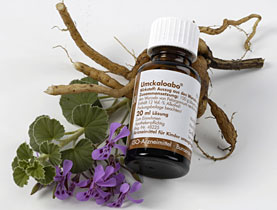
Swiss NGO defends biopiracy claim

Non-governmental Swiss group Berne Declaration is helping a South African community challenge two European patents concerning use of its local plants in medicines.
German pharmaceutical company Dr Willmar Schwabe, which holds the patents and makes the highly successful umckaloabo® product based on the plants, has denied any wrongdoing.
The dispute, before the European Patent Office in Munich, Germany, involves two species of pelargonium – a type of geranium native to the Eastern Cape of South Africa.
Extracts have been in use in Europe for more than 100 years. Dr Willmar Schwabe markets umckaloabo® for coughs and respiratory complaints.
The two patent challenges – on the extraction method used and the exclusive use of pelargonium in Aids treatments – are being brought by the community of Alice with the African Centre for Biosafety (ACB).
ACB director Mariam Mayat told swissinfo that the community believed that the patents were unlawful and undermined its rights. She was speaking at a media conference in Zurich on Thursday.
“The community has since time immemorial had access to these plants and have used the roots to treat in a traditional way various ailments, in humans and animals,” she said, adding that the plant was suffering over exploitation.
For her, Schwabe’s activities were in contravention of the United Nations Convention on Biological Diversity (CBD) – on the protection, sustainable usage and sharing of benefits arising from the utilisation of genetic resources.
As signatories, the Swiss, German and South African governments should intervene, said Mayat.
Traditional knowledge
The community wants the patents to be withdrawn. It’s also calling for compensation and for the species to be protected locally.
“Our community wants to stop companies from claiming that they have invented this medication because they are behaving like thieves taking away our traditional knowledge,” spokeswoman Nomthunzi Sizani said.
Also supporting the action, along with several German NGOs, is Basel University patent specialist Fritz Dolder.
Dolder told swissinfo that there was no basis for the extraction patent because the process was not novel or inventive.
The use of pelargonium for Aids could not be monopolised because the plants had already been used traditionally for treating Aids-related illnesses, he added.
Umckaloabo® has been permitted in Switzerland since 2007. According to the Berne Declaration, Swiss sales amounted to around SFr6 million ($5.75 million), with those in Germany around SFr40 million.
“We are opposing the patents because it is clear that it is also the fault of developed countries such as Switzerland that these biopiracy cases still exist,” the group’s François Meienberg told swissinfo, adding that patent law should be tightened.
Company reaction
The extraction patent challenge was filed in March, with the other due at the end of May.
In reaction to the first patent challenge, Traugott Ullrich, director of marketing and sales at Spitzner Pharmaceuticals, a Schwabe subsidiary, said that the Schwabe product could not be measured by the CBD.
“The use of pelargonium extracts not only has a long tradition in Africa, it now has a more than 100 years old tradition of medicinal use in Europe as well… after 50-60 years of use all over Europe in different preparations and different indications, we acquired the product and developed it further,” he told swissinfo.
Ullrich denied that the company had taken traditional knowledge, saying that the company’s end product was very different. Harvesting was sustainable, he added.
“We now have a very complex, very sophisticated extraction procedure which was developed by our own knowledge and investment into research and those things cannot be compared,” he said.
swissinfo, Isobel Leybold-Johnson in Zurich
The patent challenges come ahead of the ninth meeting of the Conference of the Parties (COP 9) on the UN Convention on Biological Diversity (CBD), in Bonn, Germany. It takes place from May 19 to 30, 2008.
COP 9 will also coincide with the International Biodiversity Day, on May 22.
The CBD is one of the three agreements under international law that were passed at the UN Conference on Environment and Development in Rio de Janeiro in 1992.
The CBD is not a traditional convention on the protection of species. It covers the entire area of protection and sustainable use of biological diversity with regard to habitats, species and genes. The political focus is in particular on the protection and sustainable use of forests and marine eco-systems.
Biopiracy is described as the practice of commercially exploiting naturally occurring biochemical or natural material, especially by obtaining patents which restrict its future use, while failing to pay compensation to the community from which is originates.
One famous case was the Neem tree in India, whose medicinal properties have been recognised for thousands of years.
Patents on the use of Neem have been taken out by international companies, one of which was at the centre of a ten-year court battle. Fritz Dolder was also involved in this case.
The case, put before the European Patent Office, claimed it was not possible to patent ancient knowledge, and called it biopiracy. The patent was later revoked.

In compliance with the JTI standards
More: SWI swissinfo.ch certified by the Journalism Trust Initiative






























You can find an overview of ongoing debates with our journalists here . Please join us!
If you want to start a conversation about a topic raised in this article or want to report factual errors, email us at english@swissinfo.ch.